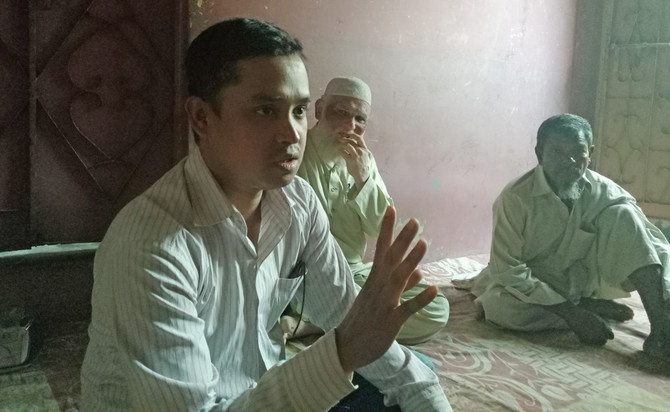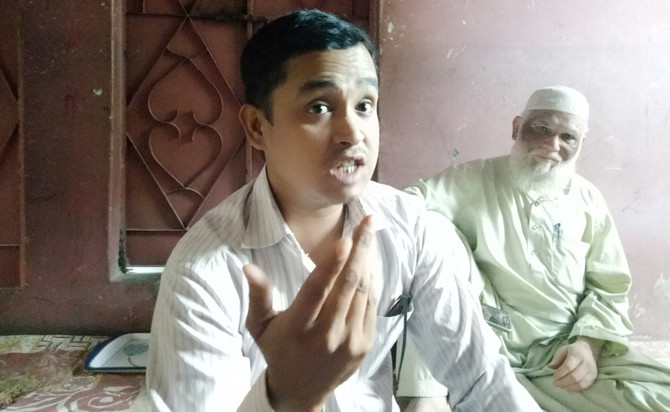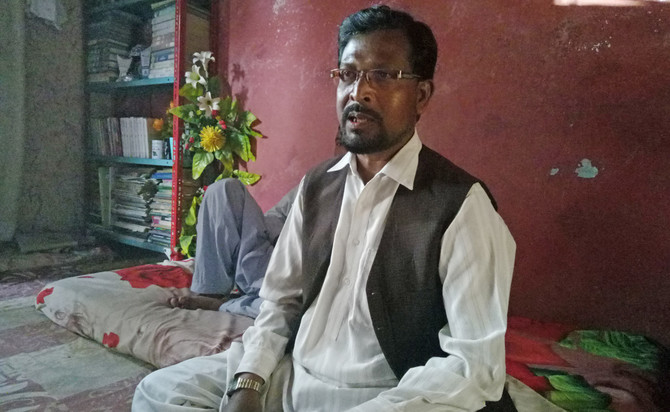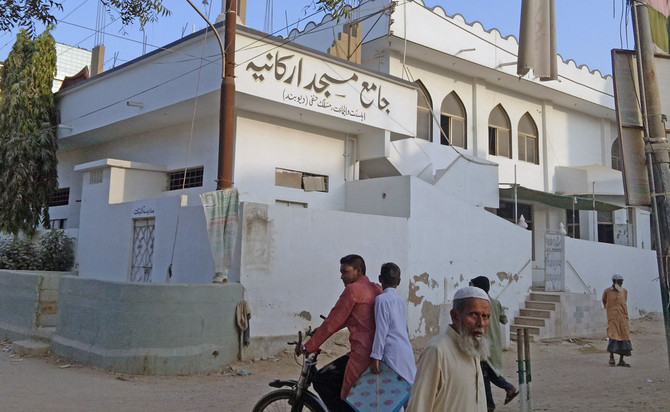KARACHI: Life for 42-year-old Noor Alam, a Rohingya Muslim living in Baldia Town, was never smooth.
Alam, a father of four, caught polio which made him partially disabled.
His problems increased as his children grew up, Syed Muhammad Yousuf, Alam’s friend and a Rohingya activist, told Arab News.
Alam, who drives an autorickshaw to earn for his family, was born in 1965 in Karachi where his parents came from, in what was then East Pakistan – it’s now Bangladesh.
In 2014, two of his four children – a daughter and a son – were promoted to Grade Nine, for which they required a computerized B-Form.
B-Form, a certificate mandatory for enrolling in secondary education, had not been needed before.
“When he applied for a B-Form for his two children, the local officials of NADRA (National Data Base Registration Authority) sent his case for verification,” Yousuf explained, but three years later verification has not been completed.
His elder son and daughter have not been able to acquire secondary education and Alam is also worried about his two other children.
The identity cards of his entire family are now blocked.
It is not only Alam’s story, Yousuf said. “This is the story almost every second of over 800,000 Rohingya families living in the commercial capital of Pakistan.”
All those able to get higher education did so before 2014 when the B-form wasn’t declared mandatory for enrolment.
The Rohingya community in Pakistan is living in a state of uncertainty and “the issue of education of their children tops its list of problems,” said Shaheedullah, a Rohingya youth.
Zabihullah Arakani, President of the Pak Rohingya Welfare Organization, told Arab News that the Rohingya community lived in more than 60 slums in Karachi.
The last influx of Rohingya came to Pakistan in the early 1990s, said 64-year-old Muhammad Saleem, who still remembers his horrifying journey from Myanmar to East Pakistan in 1969.
His family came to Karachi after spending a few years in East Pakistan. He complained that despite having lived in the country for decades, the Rohingyas are denied a Pakistani identity.
Back in Myanmar, he said, oppression of Rohingyas started in 1942, even before Burma’s independence.
“We came here in 1969, after which life in Burma became difficult for the Rohingyas,” Saleem added.
Here in Pakistan, community members say they want nothing but an identity and education for their kids.
Reports suggest that the Rohingya exodus to Pakistan began soon after Pakistani President Ayub Khan – who had served in Burma from 1942 to 1945 – offered during his visit to the country in 1965 to settle them on Pakistani soil.
Those who reached Karachi praise Zulfikar Ali Bhutto, former prime minister, and General Zia-ul-Haq, a former president, who allowed them to leave their refugee camps and live in the city like Pakistani nationals; but Rohingya are not happy with Bhutto’s party.
In September a senator from Bhutto’s Pakistan People’s Party, on an adjournment motion in Pakistan’s upper house, called for giving Rohingya Pakistani nationality. But he invited the ire of men of his own party, which is dominated by Sindhi-speaking people.
In November 2017, when he was Minister of State for Interior, Talal Chaudhry presented a plan to amend the Pakistan Citizenship Act of 1951 to give Pakistani nationality to Bengalis and Burmese living in Sindh. Aijaz Dhamra, Sindh Information Secretary of the Pakistan People’s Party, said that the people and the government of Sindh would not let it happen.
This opposition to awarding nationality to Rohingya, along with the interior ministry’s recent measures for more checks, has increased the miseries of the community in Pakistan.
Without computerized national identity cards, Rohingya are struggling to find jobs.
In Arkanabad in the Korangi town of Karachi, the community is associated with the fishing industry.
“Despite sharing most of the burden, I am paid less than my Pakistani fellows just because I have no identity here,” said Abul Salam, a fisherman.
“We want an identity but if even that’s denied to us, our children have the universal right to education.”
“If a way out wasn’t suggested amid these strict rules of NADRA, the coming Rohingya generation in Pakistan would be completely illiterate,” said Yousuf.
Rohingya in Karachi are ‘denied a Pakistani identity’
Rohingya in Karachi are ‘denied a Pakistani identity’

In the heart of Bahawalpur, a 152-year-old palace continues to reflect its royal past

- Built by the ruler of Bahawalpur’s princely state in 1875, Noor Mahal spans over 44,600 square feet, houses 32 rooms
- Legend says the palace was built for the nawab’s wife, who refused to live there after seeing a nearby graveyard
BAHAWALPUR: A young nawab once built a palace for his wife, so goes a local legend, only for her to abandon it after a single visit. As the tale is told, Nawab Sadiq Muhammad Khan IV had Noor Mahal constructed for his spouse, who, after spending one night there, glimpsed a nearby graveyard from the balcony and refused to return, considering it a bad omen.
The story may not hold up to historical scrutiny, but it continues to captivate the many tourists who flock to Noor Mahal, Bahawalpur’s most iconic monument. Towering over manicured gardens, the palace, built in 1875, is famed for its Indo-European architecture and striking symmetry.
Before joining Pakistan in 1956, Bahawalpur was a princely state, one of over 500 semi-autonomous territories in British India ruled by local monarchs. These rulers retained control over internal affairs while pledging allegiance to the British Crown.
The 152-year-old Noor Mahal was a crown jewel of Bahawalpur under its last great ruler, lending some credence to the theory that it may have been built as a gesture of affection for Noor Jahan, his wife. Some historians, however, offer a different reading.
“At the time, the Nawab family had multiple palaces, and Noor Mahal was primarily intended as a guest house for foreign dignitaries and experts,” Dr. Nadeem Omar Tarar, an art historian, told Arab News while challenging the popular story.
Nevertheless, another scholar, Dr. Usman Ali, maintained that the building might originally have been planned as a personal residence before its use shifted.
“The 1904 Gazetteer acknowledges that it was originally designed as a personal residence but later repurposed due to its proximity to the graveyard,” he said.
The story of Nawab Sadiq Muhammad Khan’s ascension to the throne is equally intriguing. When his father died at the age of 29 on March 25, 1866, Khan was just four years old. The young nawab was immediately declared his successor, but his position was challenged by rival factions seeking control of the state.
Fearing internal unrest, his family and loyalists turned to the British for support. In return for their intervention, the British assumed guardianship of the child ruler, securing complete political influence over Bahawalpur.
“The British government took the young Nawab under its guardianship, ensuring his personal education, health and training while also focusing on the development of every sector of the state,” Hafizur Rahman Hafiz wrote in his 1924 book, “Tajdaran-e-Riyasat Bahawalpur.”
To oversee both state affairs and the young Nawab’s upbringing, Major Charles Cherry Minchin was appointed political agent in November 1866 and served as the de facto authority until Nawab Sadiq IV formally assumed power at the age of 18.
Noor Mahal was constructed over an area of 44,600 square feet, featuring 32 rooms — 14 of them in the basement — along with six verandas and five domes.
Its design was selected from 11 architectural proposals solicited from across India, with the final plan submitted by a building designer named Muhammad Hussain, adopted with minor modifications.
The palace blends Corinthian and Islamic styles, with columns, balustrades and pediments sitting alongside domes and angled arches, a signature of Indo-Saracenic architecture.
A commemorative inscription and state coins were buried in its foundations during construction as a good omen, according to court historian Azizur Rahman Aziz in his book, “Subh-e-Sadiq.”
After Bahawalpur joined Pakistan in 1956, Noor Mahal came under the Auqaf Department. In 1971, the Pakistan Army leased the property and eventually bought it in 1997 for Rs119 million ($428,400).
Today, the palace is open to the public and remains a major tourist attraction. Each evening, visitors gather for a sound and light show narrating Bahawalpur’s history, from its state rulers to its accession to Pakistan.
“The immersive experience draws large crowds every weekend, running throughout the year,” said local tourism official Waqas Ahmed.
Pakistan delivers first batch of quake aid to Myanmar as death toll tops 3,000

- Aid workers fear higher death toll from 7.7 quake as remote areas remain cut off
- Earthquake has worsened Myanmar’s deepening humanitarian crisis amid civil war
ISLAMABAD: Pakistan’s first humanitarian consignment for victims of the devastating earthquake in Myanmar was handed over to local authorities at Yangon International Airport, the National Disaster Management Authority in Islamabad said in a statement on Thursday.
The 7.7-magnitude earthquake struck nearly a week ago, with its epicenter near Mandalay, Myanmar’s second-largest city. It caused widespread devastation, toppling thousands of buildings, buckling roads and destroying key infrastructure across several regions.
The death toll has climbed to 3,085, according to an update by Myanmar’s military authorities, who said 4,715 people were injured and 341 remain missing.
Pakistan has pledged 70 tons of relief goods to Myanmar and has so far delivered half the promised amount.
“Ambassador of Pakistan at Myanmar H.E. Imran Haider along with Pakistan Embassy’s diplomats/ officials handed over the relief goods to the Chief Minister of Yangon Region and Director General Training of MoFA [Ministry of Foreign Affairs],” the NDMA said.
“The Government of Pakistan and Pakistan’s National Disaster Management Authority remains steadfast in its commitment to providing humanitarian assistance to earthquake-affected people of Myanmar,” it added.
The natural disaster has worsened an already dire humanitarian situation in Myanmar, where the military junta seized power from Aung San Suu Kyi’s elected government in 2021, triggering a nationwide civil conflict.
Even before the quake, over 3 million people had been displaced and nearly 20 million were in need of humanitarian assistance, according to the United Nations.
Media reports and aid workers warn the true toll could be far higher, as many remote areas remain inaccessible due to damaged infrastructure and disrupted communication lines.
With input from AP
UN rights council adopts Pakistan-led OIC resolution on Palestine seeking Israel’s accountability

- Pakistan’s top diplomat at the UN council says impunity for human rights violations enables more and worse violations
- The resolution calls for a mechanism to prosecute those responsible for the most serious crimes against Palestinians
ISLAMABAD: The United Nations Human Rights Council on Wednesday adopted a resolution presented by Pakistan on behalf of the Organization of Islamic Cooperation (OIC), calling for accountability for Israel and justice for Palestinians in the Occupied Palestinian Territories (OPT), amid the ongoing conflict in Gaza.
The war in Gaza, which began in October 2023, has persisted despite multiple international efforts to broker a ceasefire. The Palestinian death toll, according to latest figures, has exceeded 50,000, with women and children making up a large share of the casualties.
Thousands remain missing under the rubble of buildings destroyed in Israeli airstrikes. In parallel, there have been mounting reports of harassment, arbitrary detentions, and even sexual assaults against Palestinians in the West Bank and East Jerusalem.
“Over the past eighteen months, the Palestinian people under occupation have faced horror upon horror,” Pakistan’s top diplomat at the UN mission in Geneva, Ambassador Bilal Ahmed, told the Council. “Whether in the desolate Gaza Strip or the West Bank including East Jerusalem, this Council has borne witness to a litany of crimes that demand justice.”
Ahmed said the resolution reflects the International Court of Justice’s advisory opinion from July 2024, which declared Israel’s continued presence in the Palestinian territories illegal.
It also incorporates findings by the UN Independent International Commission of Inquiry on the widespread and systematic use of sexual violence against Palestinians, particularly women and girls.
The resolution emphasizes the need to prevent and punish “incitement to genocide in Gaza,” in line with the ICJ’s provisional measures issued in January 2024.
It further calls for the establishment of an independent mechanism to assist in the investigation and prosecution of those responsible for the most serious crimes under international law.
“We have long known that impunity for human rights violations enables more and worse violations,” Ahmed said. “The adoption of this resolution would signal the strong resolve of this Council to end impunity for serial violators. For the Palestinian people, it would be the light at the end of an unimaginably dark tunnel.”
Pakistan’s Permanent Mission to the United Nations in Geneva confirmed later that the resolution was adopted by an overwhelming majority.
Trump targets Pakistan with 29% tariff as part of new trade policy

- US is a key market for Pakistani exports, with bilateral trade estimated at $7.3 billion in 2024
- US has also slapped a 26% reciprocal tariff on India, dashing New Delhi’s hopes of tariff relief
KARACHI: United States President Donald Trump announced on Wednesday the imposition of reciprocal tariffs on several countries, including a 29% tariff on Pakistani products, a move widely seen as a jolt to the global economy still recovering from the COVID-19 pandemic.
The decision came after Trump defended the measures as necessary to address long-standing trade imbalances and what he described as unfair treatment of American goods abroad.
The US leader has called for realigning trade with both allies and competitors since taking office, arguing that high tariffs imposed by partner countries have effectively subsidized their economies at America’s expense.
According to a list of tariffs shared by Reuters, Trump has imposed a 29% tariff on Pakistan.
“Pakistan has been charging us a 58% tariff on our goods,” he was quoted as saying by Geo TV. “Hence, we are imposing a 29% tariff on their products.”
The US remains one of Pakistan’s largest trading partners.
According to the Office of the United States Trade Representative, total goods trade between the US and Pakistan was estimated at $7.3 billion in 2024. US exports to Pakistan reached $2.1 billion, marking a 4.4% increase from the previous year, while imports from Pakistan totaled $5.1 billion, up 4.9% compared to 2023.
Alongside Pakistan, the US has also slapped a 26% reciprocal tariff on India, in a blow to New Delhi’s expectations of tariff relief.
“In many cases, the friend is worse than the foe in terms of trade,” Reuters quoted Trump as saying during the announcement. “We subsidize a lot of countries and keep them going and keep them in business. Why are we doing this? I mean, at what point do we say you got to work for yourselves.”
“We are finally putting America first,” he added, calling trade deficits “a national emergency.”
Trump held up boards displaying the new tariff rates, ranging from 10% to 49% for most countries. He said that in most cases, the US was imposing about half the tariff rates that other countries charge, though in some instances the rates were matched exactly.
With input from Reuters
Over 51,000 tourists visited northwestern Pakistan during first two days of Eid

- Khyber Pakhtunkhwa’s picturesque Naran valley sees highest number of tourists, 28,112, says tourism authority
- Northwestern Pakistan is home to many picturesque locations, scenic spots dotted with mountains, valleys and lakes
PESHAWAR: Over 51,000 tourists flocked to various picturesque destinations across Pakistan’s northwestern Khyber Pakhtunkhwa (KP) province during the first two days of the Eid Al-Fitr holidays, the provincial tourism authority spokesperson said this week.
The northwestern province is home to many picturesque locations and scenic spots dotted with mountains, valleys and lakes. Some of the popular tourist spots in the province can be found in Swat Valley, Malam Jabba, Abbottabad, Kaghan, Naran and Shogran which Pakistanis from all over the country visit during Eid holidays.
Pakistan marked the three-day Eid Al-Fitr holiday, which is celebrated by Muslims across the world when the fasting month of Ramadan ends, from Mar. 31-Apr. 2.
“Tourists flocked to various tourist destinations in Khyber Pakhtunkhwa on Eid-Al-Fitr,” Muhammad Saad, the spokesperson for the KP Tourism Authority, said in a statement on Wednesday.
“More than 51,000 tourists were recorded in the first two days.”
He said the highest number of tourists came to KP’s scenic Naran valley, 28,112, during the first two days and the Galiyat region saw 17,000 visitors during the same time period.
At least 3,100 tourists visited Kumrat valley, he added.
“Tourism police personnel are performing their duty at various tourist destinations,” the official said.
Tourism saw a massive surge in KP during last year’s Eid holidays, registering an increase of over 360 percent compared to 2023. As per data released by the provincial tourism authority last year, at least 580,000 tourists visited northwestern Pakistan during the five-day holidays in April 2024.
While Pakistan’s inflation has declined considerably since last year, militant attacks, particularly in KP, have peaked recently.
Militant attacks in Pakistan surpassed 100 in March for the first time in over nine years, marking it to be the deadliest month since 2015, leading security think tank Pakistan Institute for Conflict and Security Studies (PICSS) said on Tuesday.
The think tank said KP and Balochistan were the hardest hit provinces last month, though Punjab and Sindh also experienced an uptick in militant activity.
Islamabad has repeatedly blamed Afghanistan for providing shelter to militant groups targeting civilians and security forces in cross-border attacks in KP, an allegation denied by the authorities in Kabul.


















